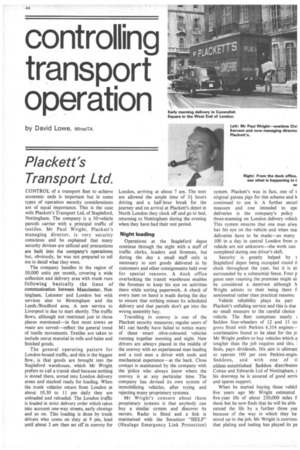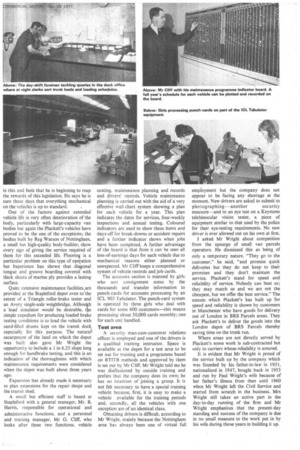controlling transport operation
Page 52

Page 53

If you've noticed an error in this article please click here to report it so we can fix it.
by David Lowe, minstTA
Plackett's Transport Ltd.
CONTROL of a transport fleet to achieve economic ends is important but in some types of operation security considerations are of equal importance. This is the case with Plackett's Transport Ltd, of Stapleford, Nottingham. The company is a 50-vehicle parcels carrier with a principal traffic of textiles. Mr Paul Wright, Plackett's managing director, is very security conscious and he explained that many security devices are utilized and precautions are built into the company's operations; but, obviously, he was not prepared to tell me in detail what they were.
The company handles in the region of 50,000 units per month, covering a wide collection and delivery area with trunk runs following basically the lines of communication between Manchester, Nottingham, Leicester and London but with services also to Birmingham and the Leeds /Bradford area. A new service to Liverpool is due to start shortly. The traffic flows, although not restricted just to those places mentioned—in fact most towns en route are served—reflect the general trend of textile movements. Textiles are taken to include uncut material in-rolls and bales and finished goods.
The general operating pattern for London-bound traffic, and this is the biggest flow, is that -goods are brought into the Stapleford warehouse, which Mr Wright prefers to call a transit shed because nothing is Stored there, sorted into London delivery areas and stacked ready for loading. When the trunk vehicles return from London at about 10.30 to 11 pm daily they are unloaded and reloaded. The London traffic is loaded in strict delivery order which takes into account one-way streets, early closings and so on. This loading is done by trunk drivers Who come on duty at 9 piri, load until about 3 am then set off in convoy for
London, arriving at about 7 am. The men are allowed the ample time of 3f hours driving and a half-hour break for the journey and on arrival at Plackett's depot in North London they clock off and go to bed, returning to Nottingham during the evening when they have had their rest period.
Night loading Operations at the Stapleford depot continue through the night with a staff of traffic clerks, loaders and foremen, but during the day a small staff only is necessary to sort goods delivered in by customers and other consignments held over for special reasons. A dock office overlooking the transit warehouse enables the forernin to keep his "eye on activities there while sorting paperwork. A check of every item on hand is made during the day to ensure that nothing misses its scheduled delivery and that parcels don't get into the wrong assembly bay.
Travelling in convoy is one of the Plackett security measures; regular users of Ml can hardly have failed to notice many of these -smart olive-coloured vehicles running together morning and night. New drivers are always placed in the middle of the convoy with an experienced man leading and a tool man a driver with tools and mechanical experience—at the back. Close contact is maintained by the company with the -POlice who always know where the convoy is at any particular time. The company has devised its own system of immobilizing vehicles, after trying and rejecting many proprietary systems.
Mr Wright's concern about these proprietary systems is that anybody can buy a similar system and discover its secrets. Radio is fitted and a link is maintained with the Securicor "HELP" (Haulage Emergency Link Protection) system. Plackett's was in fact, one of t original guinea pigs for this scheme and h continued to use it. A further securi measure and one intended to spe deliveries is the company's policy three-manning on London delivery vehicli This system ensures that one man alwa has his eye on the vehicle and when ma] deliveries have to be made—as many 100 in a day in central London from o vehicle are not unknown—the work can completed during one driver's shift.
Security is greatly helped by t Stapleford depot being occupied round ti clock throughout the year, but it is al: surrounded by a substantial fence. Four p geese seen roaming the premises might al: be considered a deterrent although Is Wright admits to their being there 11 sentimental rather than practical reasons.
Vehicle reliability plays its part Plackett's unfailing service and this is due no small measure to the careful choice vehicle. The fleet comprises nearly ; Seddon four-wheelers of 12 and 13 toi gross fitted with Perkins 6.354 engines— combination found to be ideal for the jo Mr Wright prefers to buy vehicles which a tougher than the job requires and this, I finds, pays dividends. His aim is ultimate to operate 100 per cent Perkins-engini Seddon' s, and with one of ti oldest-established Seddon distributoi Cottee and Edwards Ltd of Nottingham, c his doorstep he is assured of good servil and spares support.
When he started buying these vehicl five years ago Mr Wright estimated five-year life of about 250,000 miles fi them but he now finds that he will be able extend the life by a further three yea because of the way in which they ha' stood up to the job. Mr Wright is convino that plating and testing has played its pa in this and feels that he is beginning to reap the rewards of this legislation. He says he is sure these days that everything mechanical on the vehicles is up to standard.
One of the factors against extended vehicle life is very often deterioration of the body, particularly with large-capacity van bodies but again the Plackett's vehicles have proved to be the one of the exceptions; the bodies built by Reg Watson of Nottingham, a small but high-quality body-builder, show every sign of giving the service required of them for this extended life. Flooring is a particular problem on this type of operation but Experience has shown that diagonal tongue and groove boarding covered with thick sheets of marine ply provides a lasting surface.
Quite extensive maintenance facilities, are provided at the Stapleford depot even to‘the extent of a Triangle roller-brake tester and an Avery single-axle weighbridge. Although a load simulator would be desirable, tip simple expedient for producing loaded brake testing conditions is to load the vehicle with sand-filled drums kept on the transit dock, especially for this purpose. The naturalt escarpment of the land on which the depot was built also gave Mr Wright the opportunity to include a 1 in 6.25 slope long enough for handbrake testing, and this is an indication of the thoroughness with which maintenance requirements were considered when the depot was built about three years ago.
Expansion has already made it necessary to plan extensions for the repair shops and the transit shed.
A small but efficient staff is based at Stapleford with a general manager, Mr. B. Harris, responsible for operational and administrative functions, and a personnel and training manager, Mr G. Cliff, who looks after these two functions, vehicle costing, maintenance planning and records and drivers' reccirds. Vehicle maintenance planning is carried out with the aid of a very effective wall-chart system showing a plan for each vehicle for a year. This plan indicates the dates for services, four-weekly inspections and annual testing. Coloured indicators are used to show these items and days off for break-downs or accident repairs and a further indicator shows when jobs have been completed. A further advantage of the board is that from it can be seen all loss-of-earnings days for each vehicle due to mechanical reasons either planned or unexpected. Mr Cliff keeps a comprehensive system of vehicle records and job cards.
The accounts section is manned by girls who sort consignment notes by the thousands and transfer information to punch-cards for accounts processing by an ICL 903 Tabulator. The punch-card system is operated by three girls who deal with cards for some 600 customers—this means processing about 50,000 cards monthly; one for each unit handled.
Test area
A security man-cum-customer relations officer is employed and one of the drivers is a qualified training instructor. Space is available at the depot for a test area to be set out for training and a programme based on RT1TB methods and approved by them is set out by Mr Cliff. Mr Wright told me he was disillusioned by outside training and prefers that the company does its own; he has no intention of joining a group. It is not felt necessary to have a special training vehicle because, first, it is easy to make a vehicle available for the training periods and, secondly, all the vehicles with one exception are of an identical class.
Obtaining drivers is difficult, according to Mr Wright, mainly because the Nottingham area has always been one of virtual full employment but the company does not appear to be facing any shortage at the moment. New drivers are asked to submit to photographing--another security measure—and to an eye test on a Keystone telebinocular vision tester, a piece of equipment similar to that used by the police for their eye-testing requirements. No new driver is ever allowed out on his own at first.
I asked Mr Wright about competition from the upsurge of small van parcels operators. He dismissed this as being of only a temporary nature. "They go to the customer," he said, "and promise quick deliveries but they do not keep to their promises and they don't maintain the service. Plackett's stand for speed and reliability of service. Nobody can beat us; they may match us and we are not the cheapest, but we offer the best service." The esteem which Plackett's has built up for speed and reliability is shown by customers in Manchester who have goods for delivery out of London in BRS Parcels areas. They ask Plackett's to deliver the goods into the London depot of BRS Parcels thereby saving time on the trunk run.
Where areas are not directly served by Plackett's some work is sub-contracted but only to carriers whose reliability is assured.
It is evident that Mr Wright is proud of the service built up by the company which was founded by his father-in-law in 1931, nationalized in 1947, bought back in 1953 and run by Paul Wright's wife because of her father's illness from then until 1960 when Mr Wright left the Civil Service and started from scratch in the business. Mrs Wright still takes an active part in the day-to-day running of the firm and Mr Wright emphasizes that the present-day standing and success of the company is due in no small measure to the work put in by his wife during those years in building it up.










































































































